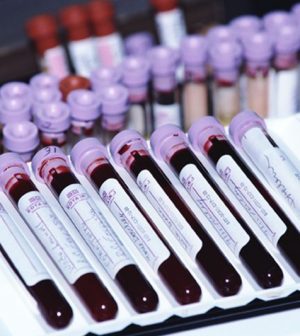- Recognizing the Signs of Hypothyroidism
- 10 Strategies to Overcome Insomnia
- Could Artificial Sweeteners Be Aging the Brain Faster?
- Techniques for Soothing Your Nervous System
- Does the Water in Your House Smell Funny? Here’s Why
- Can a Daily Dose of Apple Cider Vinegar Actually Aid Weight Loss?
- 6 Health Beverages That Can Actually Spike Your Blood Sugar
- Treatment Options for Social Anxiety Disorder
- Understanding the Connection Between Anxiety and Depression
- How Daily Prunes Can Influence Cholesterol and Inflammation
Study Refutes Theory That Blood Type Affects COVID Risk

A or B, AB or O, it doesn’t matter — your blood type has nothing to do with your risk of contracting severe COVID-19, a new study concludes.
Early in the pandemic, some reports suggested people with A-type blood were more susceptible to COVID, while those with O-type blood were less so.
But a review of nearly 108,000 patients in a three-state health network has found no link at all between blood type and COVID risk.
“Since the beginning of this pandemic, there have been associations postulated between blood type and disease susceptibility,” said Dr. Amesh Adalja, a senior scholar with the Johns Hopkins Center for Health Security.
“From this large study, it appears that there is no association between blood type and susceptibility or severity, and other explanations were likely present,” added Adalja, who had no role in the study.
An early report from China suggested that blood type might influence COVID risk. Subsequent studies from Italy and Spain backed that up, researchers said in background notes.
However, other studies out of Denmark and the United States offered mixed and conflicting results.
To clear things up, researchers led by Dr. Jeffrey Anderson, from Intermountain Medical Center Heart Institute in Murray, Utah, analyzed data from tens of thousands of patients with Intermountain Healthcare, a nonprofit health system of 24 hospitals and 215 clinics in Utah, Idaho and Nevada.
Of those in the analysis, nearly 11,500 tested positive for coronavirus, while the rest tested negative.
Blood type did not play a significant role in anyone’s risk of contracting COVID, the researchers reported April 5 in JAMA Network Open.
“I’ve always said this whole thing with the blood types is much hoopla about nothing,” said Dr. Aaron Glatt, chairman of the department of medicine and hospital epidemiologist at Mount Sinai South Nassau in Oceanside, N.Y. “It was never a significant enough thing that people should be terrified if they have one sort of blood type or reassured if they have another blood type. It never made any practical difference.”
Glatt was not involved in the new research.
He said the findings from earlier studies demonstrate why correlation is not the same as causation — in other words, why showing that two things are statistically linked is not the same as proving that one caused the other.
“If you go and look at enough things, you will find some random incidental findings that may or may not have any significance,” Glatt said. “Some people looked at so many different variables and one of them was blood type. They saw that some people did worse with a certain blood type, but the studies were conflicting, which makes sense if it’s random.”
Glatt concluded: “This puts this whole thing to rest, but it never should have been up.”
More information
The U.S. Centers for Disease Control and Prevention has more about COVID-19 risk factors.
SOURCES: Amesh Adalja, MD, senior scholar, Johns Hopkins Center for Health Security, Baltimore; Aaron Glatt, MD, chairman, department of medicine, and hospital epidemiologist, Mount Sinai South Nassau, Oceanside, N.Y.; JAMA Network Open, April 5, 2021
Source: HealthDay
Copyright © 2026 HealthDay. All rights reserved.










